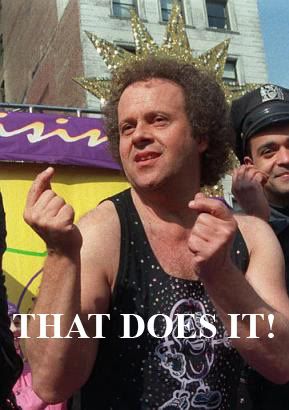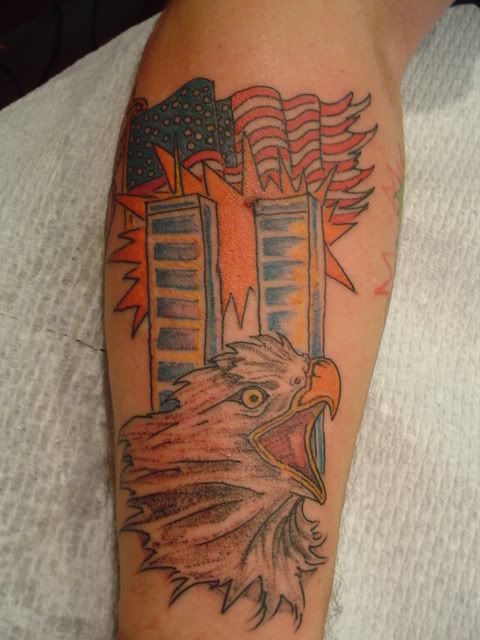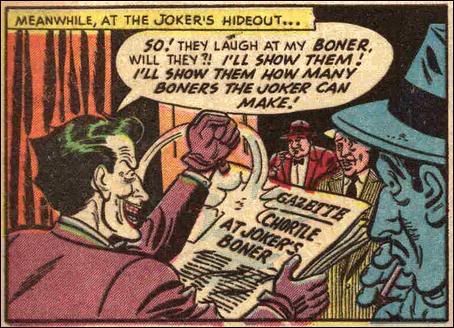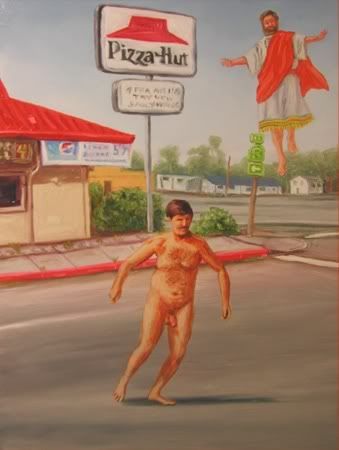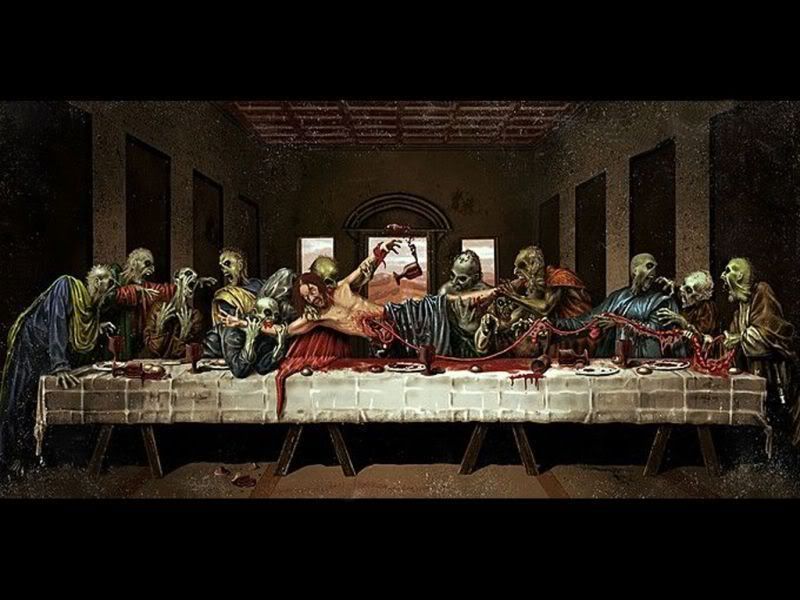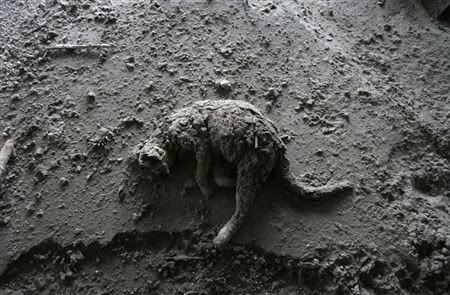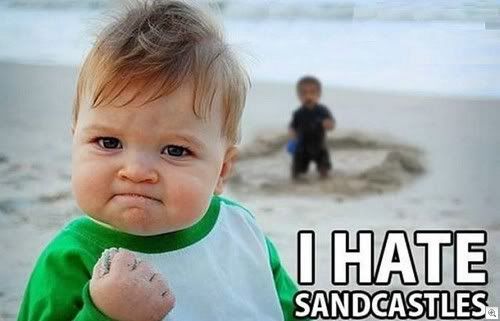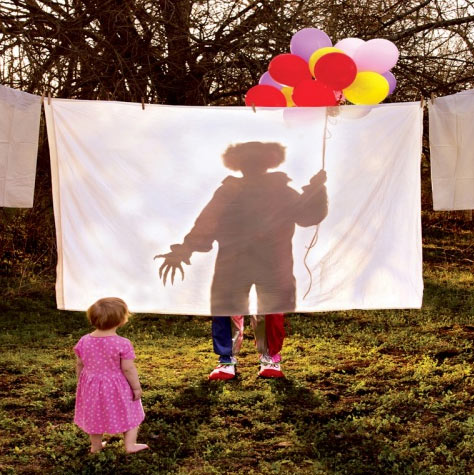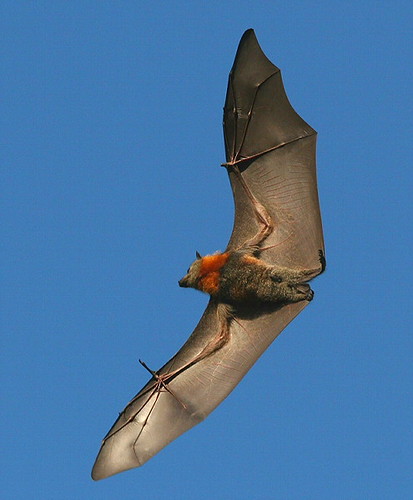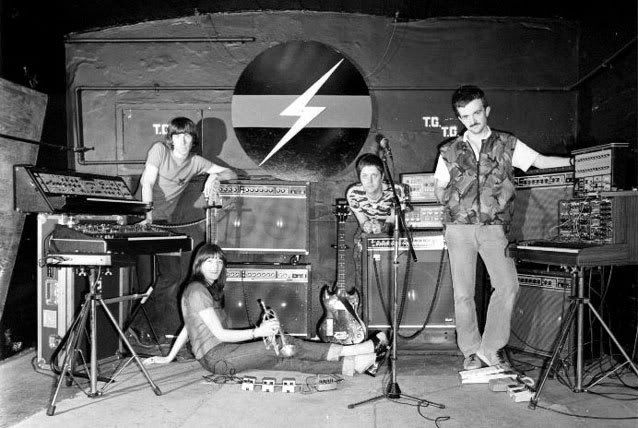
THE MOVIE YOU WILL NEVER SEE
by Alexandro Jodorowsky
"To show the process of illumination of a hero, then a people, then an entire planet (which in turn is the Messiah of the Universe since in abandonning its orbit, the holy planet leaves to spread its light through all the galaxies)...
I didn't want to respect the novel, I wanted to recreate it. For me, Dune didn't belong to Herbert just as Don Quixote didn't belong to Cervantes.
There is an artist, one alone among millions of others artists, who one time in his life, by a piece of divine grace, receives an immortal theme, a MYTH...I say "receive" and not "create" because works of art are received in a state of mediumness directly from the collective unconcious. The work overtakes the artist and in some way it kills him, because humanity, in receiving the impact of Myth, has a profound need to erase the individual who receives it and transmits it: his individual personality hampers, stains the purity of the message which, at the root, asks to be anonymous... We don't know who created the Notre-Dame cathedral, nor the Aztec solar calendar, nor the tarot of Marseille, nor the myth of Don Juan, etc.
One feels that Cervantes gave HIS version of Quixote--of course incomplete--and that we carry in our soul our total character... Christ didn't belong to Mark, Luke, Matthew or John... There are many more gospels called apocryphal and there are as much lives of Christ as there are believers. Everyone of us has their story of Dune, their Jessica, their Paul... I feel fervent admiration towards Herbert and at the same time conflict (I think the same thing happened to him)... He hampered me... I didn't want him as an advisor of technique... I did everything to keep him away from the project... I had received a version of Dune and I wanted to transit it: the myth had to abandon the literary form and become image...
In the film, Duke Leto (father of Paul) would be a man castrated in a ritual combat in the arenas during a bullfight. (The emblem of the Atreide house being a sacred bull...) Jessica--Bene Gesserit nun--, sent like a concubine to the duke to create a daughter who would be the mother of a Messiah, falls so much in love with Leto that she decides to blow a link in the chain and create a son, the Kwizatz Haderach, the saviour. In using her powers of Bene Gesserit--as soon as the duke, madly in love with her, confides his sad secret--Jessica lets herself be inseminated by a drop of blood of this sterile man... The camera followed (in the script) the red drop through the ovaries of the woman and accompanied its meeting with the ovule where, by an miraculous explosion, it inseminates the egg. Paul was born of a virgin, and not by the sperm of his father but by his blood... In my version of Dune, the Emperor of the Galaxy is mad. He lives on an artificial planet of gold, in a palace of gold constructed according to the non-laws of anti-logic. He lives in symbiosis with a robot identical to him. The resemblance is so perfect that the citizens never know if they are facing the man or the machine... In my version, the spice is a blue drug of a spongy consistency filled with a vegtable-animal life endowed with consciousness, the highest level of consciousness. It doesn't stop taking all sorts of forms, shifting without cease. The spice continually reproduces the creation of innumerable universes.
Baron Harkonnen is an immense man of 300 kilograms. He is so fat and heavy that, in order to move, he needs to continually use antigravitational bubbles attached to his extremities... His delusions of grandeur have no limit: he lives in a palace constructed as a portrait of himself... This immense sculpture stands on a sordid swampy planet...In order to enter the palace, one has to wait for the colussus to open its mouth and stick out a tongue of steel (landing strip...) At the end of the movie, the wife of Count Fenring bounds towards Paul, who has already become Fremen, and she slices his throat. Paul while dying says: "Too late, you can't kill me... because..." "Because, (continues Jessica with the voice of Paul) in order to kill the Kwizatz Haderach, you would have to kill me too..." And every Fremen, every Atreide talks now with the voice of Paul: "I am the man collective. He who shows the way."
Reality transforms rapidly. Three columns of light shoot out from the planet. They mix. Sink into the sand of the planet: "I am the Land that awaits the seed!" The spice dries up. The sun trembles. Drops of water form a piller surrounded by fire.
Filaments of silver surge from the spice. Creating a rainbow. They merge into a cloud of water, producing a red "lava". Then vapor. Some clouds. Some rain. Some rivers. Some grass. Some forests. Dune becomes green. A blue ring now surrounds the planet. It separates. It produces more and more rings. Dune is at present an illuminated world which traverses the galaxy, that leaves it, that gives its light--which is consciousness--to all the universe. In order to conceive this final sequence of transmutation of matter, I had the chance to come in contact with some real alchemists... Some mysterious beings (one of them seemed to have more than a hundred years, an advanced age which yet permitted him to move about with the energy of a young adolescent) approached me because Dune could be a philosophical stone, the stone which changes all the other metals into gold... In this sequence, they described what really happens when they transform, in their alchemical ovens, matter... For the "guerilla" war that Paul and the Fremen lead against the imperial army, I had the chance to contact a guerilla expert in South America... He had fought in Bolivia, Chili, Peru and Central America... His precious information brought to the story a soldierly reality...
When Jessica becomes the supreme mother of the Fremen and has to go through the ceremonies of initiation, learn sorcerors' medecine and contact other dimensions of reality, I knew of gypsy magical medecine through Paul Derlon, already deceased... And the ceremony of magic mushrooms and the miraculous operations by the witch Pachita, a being who had way more powers than the so-called Phillipino surgeons. My son Brontis, who had to play Paul, was initiated at age nine by a legendary bodyguard--Jean-Pierre Vigneau--at knife combat(real combat), at karate, at archery... He received lessons from an almost real mentat--Michel de Roisin--who possessed an encyclopedic brain... I remember seeing him give Brontis a lesson on the fable La Cigale et la Fourmi which lasted more than fifteen days... Through the verses, he described a whole age and its civilisations.
With the production, we traversed the Sahara. I wanted to film Dune in the Tassili, braving with the actors, the thousands of extras and the technical teams, the torrid heat and the dryness to get a real lunar landscape... The Algerian government was very interested by the project...
One time, divinity really wanted to tell me in a lucid dream: "Your next film must be Dune". I had not read the novel. I got up at six in the morning and like an alcoholic who awaits the opening of the bar, I waited for the bookstore to open to buy the book. I read it in one stroke without stopping to drink or eat. Right at midnight, the same day, I finished reading it. At a minute after midnight, from New York, I called Michel Seydoux in Paris... He would be the first of the seven samurai that I needed for the immense project. Michel was for me a young man (26 years old) without experience in the cinema but his society Camera One had bought the rights to The Holy Mountain, my last film and had distributed it very well... He told me: "I would like to make a movie with you." I didn't know much about him but, by intuition which surprises me today, seeing him, despite his youth, I recognized in him the greatest producer of this age... Why? Mystery... And I wasn't wrong. When I told him I wanted to purchase the rights to Dune and that the film had to be international because it would be more than ten million dollars (a fabulous sum for that time: even Hollywood didn't believe in science-fiction films, 2001 would be unique and unsurpassable) he didn't move a muscle: "Alright. We'll meet in two days in Los Angeles to buy the rights". He hadn't read the book... I think that he still hasn't read it because the prose of Herbert is bored him... And the rights could be bought-- easily because Hollywood found the book unfilmable and non commercial... Michel Seydoux gave me a carte blanche and an enormous financial support: I could create my team without economic problems. I needed a precise script... I wanted to direct the film on paper before filming... Now all films with special effects are made like that, but at that time this technique wasn't used. I wanted a comic artist who had the genius and the speed, who could serve as camera and at the same time give give a visual style...I found myself by accident with a warrior: Jean Giraud alias Moebius(at the time he hadn't yet done The Airtight Garage). I tell him: "If you accept this job, you have to abandon everything and leave tomorrow with me for Los Angeles to talk with Douglas Trumbull(2001 A Space Odyssey)". Moebius asked me for some hours to think it over. The next day, we left for the United States. It would be a long story...Our collaboration, our meetings in America with strange illuminaries and our conversations at seven in the morning in the little cafe that was the base of our work and was by "chance" called "cafe Univers". Gir made more than 3000 all marvelous drawings...The script of Dune thanks to his talent is a masterpiece. You can see the characters living, you follow the movements of the camera. You visualize the editing, the decors, the costumes...All that with, each time, some strokes of a pencil...I was behind his shoulders asking him for different points of view...In directing the actors, etc. We had filmed the movie...
For the third warrior I needed and ingenious dreamer who could paint the space ships in a different way than the American films. That's why I wrote to Christopher Foss, an English painter who illustrated science-fiction book covers... Like Giraud, he had never thought about cinema... With great enthousiasm, he left London and came to settle in Paris... This artist, with the ships that he produced for Dune put a mark on cinema. He could create semi-living machines that could metamorphose the rocks of space with colour... He could create "battleships made thirsty dying century after century in a desert of stars waiting for the living body who would fill empty reservoirs with subtle secretions of its soul..."
After I found Giger, the Swiss painter whose catalogue Dali had shown me...His decadent art, sick, suicidal, genial, was perfect to create the Harkonnen planet... He made a project of the castle and the planet which really touched metaphysical horror. (Later he created the sets and monster for Alien.)
For the special effect, thanks to the power that Michel Seydoux gave me, I could refuse Douglas Trumbull... I couldn't swallow his vanity, his big boss airs and his exorbitant prices. Like a good American, he played at looking down upon the project and tried to mix us up by making us wait while talking with us the same time as ten other people on the telephone and finally by showing us the superb machines that he was trying to perfect. Tired of all this comedy, I told him to fuck off and went looking for some young talent. I was told that in L.A., it was like looking for a needle in a haystack. I saw in a modest amateur science fiction film festival a movie made sans moyens that I found to be marvelous: Dark Star.
I contacted the young man who had done the special effects: Dan O'Bannon. I almost found myself with a wolf-child. Completely outside of conventional reality, O'Bannon for me had a real genius. He couldn't believe that I could confide in him a project as important as Dune. He was forced to believe it when he received his airplane ticket for Paris. I wasn't wrong: Dan O'Bannon later wrote the screenplay for Alien and many other successful films. With Jean-Paul Gibon, who was the executive producer of Camera One and loved the project as much as we, we left for England to find the musician. A vital aspect for me: each planet had its style of music, for example a group like Magma could realize the Harkonnen warrior rhythms which would be capable of cristallizing the beauty of the sand planet with its mystery and its implacable force, the strange symphony of rings of giant worms.
Virgin Records met with us and offered us Gong, Mike Oldfield, Tangerine Dream. At this moment I say: "And why not Pink Floyd?" The group at that time was having such success that almost everyone considered that an unfeasible idea. I had the chance, thanks to my film El Topo, to be known by these musicians. They happily agreed to meet us in London at Abbey Road Studios where the Beatles had recorded their success. Jean-Paul Gibon was very pleasantly surprised that the group would see us. At that time, I had already almost lost my individual consciousness. I was the instrument of my sacred, miraculous work where everything could happen. Dune wasn't at my service, I was like the samurai that I had found, at the service of the work. They were in the middle of recording Dark Side of the Moon. Upon arriving, I didn't see a group of musicians in the middle of making their masterpiece, but four young guys eating fried steaks. Jean-Paul and I, standing in front of them, had to wait for their voraciousness be to satisfied. In the name of Dune I was taken by an anger and I left slamming the door. I wanted some artists who knew how to respect a work of such importance for human consciousness. I think that they didn't expect that. Surprised, David Gilmour ran behind us giving excuses and made us attend the final mixing of their record. What ecstasy... After, we attended their last public concert where thousands of fanatics cheered. They wanted to see The Holy Mountain. They watched it in Canada. They decided to participate in the film by producing a double album which was going to be called Dune. They came to Paris to discuss the financial part and after an intense discussion, we came to an agreement. Pink Floyd would do almost all the music of the film.
With the best music on our side, I started to look for actors. I had seen Charlotte Rampling in Zardoz. I wanted her for Jessica. She refused the role. She wanted at the time to do two or three commercial films, the life of love interested her more than art. David Carradine came to Paris, interested by the role of Leto. The actor that I wanted the most was Dali: for the small role of the mad Emperor... What an adventure!...
Dali accepted with much enthusiasm the idea of playing the Emperor of the galaxy. He wanted to film at Cadaqu”s and use as his throne a toilet made up of two intertwined dolphins. The tails would form the feet and the two open mouths would serve one to hold the "pipi", the other to hold the "caca". Dali thinks that it is in very bad taste to mix the "pipi" and the "caca".
He was told that he would be needed for seven days... Dali replied that God made the universe in seven days and that Dali, not being less than God, must cost a fortune: 100000 dollars an hour. Probably upon arriving on the set, he would decide to film each day no more than an hour for the same price.
The Daliesque happening would cost us 700000 dollars. We asked him for time, a night, to make a decision and we left each other. That night, I tore a page from a book on the tarot; it had a card reproduced on it: the Hanged Man. I wrote him a letter saying that the film couldn't pay him 700000 dollars.
For 150000 dollars, I wanted three days and no more than an hour and a half of filming. I also wanted to have a polyethylene puppet, his replica, to use as his double in the film. Dali got angry. He cried: "I'll have you like rats! I will film in Paris, but the set will cost you more than the landscape of Cadaqu”s and the cadre of my museum. Dali costs 100000 an hour!"
Bitter, he calmed down and accepted the idea of reproducing him in plastic if after the film the sculpture was given to his museum. We decided to definitively finish with the contract the next day. I had a discussion with Jean-Paul Gibon and we arrived at the conclusion that it was impossible to haggle with Dali. I meditated for a long time and I took this final decision: I reduced the role of Dali to a page and a half of script. I accepted his price, 100000 dollars an hour, but I would only use him for a single hour. The rest, I would film with his double. Dali couldn't allow himself to go back on his price. We went to see him. I gave him the little page and a half and Dali accepted the proposition because his honor was safe. He would be the highest paid actor in the history of cinema. He would earn more than Greta Garbo.
Dali, with enthusiasm, showed me his wooden bed as the sculpture of a dolphin. A worker was there, already making the blueprint of the dolphin to make the toilet. As much for Dali as for me, the card of the Hanged Man on which some words were written served as a contract. Dali liked the aristocracy and like all men of noble spirit, he respected his word.
I liked fighting for Dune. We won almost all the battles, but we lost the war. The project was sabotaged in Hollywood. It was French and not American. Their message was not "Hollywood enough". There was intrigue, plunder. The storyboard was circulated amongst all the big studios. Later, the visual aspect of Star Wars strangely resembled our style. To make Alien, they called Moebius, Foss, Giger, O'Bannon, etc. The project signalled to Americans the possibility of making a big show of science-fiction films, outside of the scientific rigour of 2001: A Space Odyssey.
The project of Dune changed our lives.
All those who participated in the rise and fall of the project of Dune have learned to fall one and a thousand times with a fierce stubbornness, until learning to stand up. I remember my old father who, while dying happy, told me: "My son, in my life, I have triumphed because I have learned to fail."
contributed by Conrad Ottay











